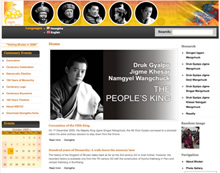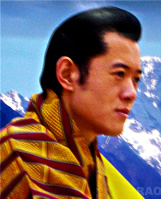| His
Majesty the King Jigme Khesar Namgyel Wangchuck |
| The 5th Druk Gyalpo |
 |
Bhutan Royal Family The King |
|
 |
Bhutan Royal Family |
| The
Coronation 2008 Links |
|
|
|
|
His
Majesty The Druk Gyalpo |
 |
The
Coronation Celebration Day of His Majesty the King Jigme Khesar Namgyel
Wangchuck is scheduled to be held on 6, 7 and 8 November 2008 .
 |
the 5th Druk Gyalpo, HM Jigme Khesar Namgyel Wangchuck |
| It
is the end - and the beginning - of history. On the morning of November
1, the third day of the ninth Bhutanese month, His Majesty the King will
be empowered as the Druk Gyalpo in a unique and sacred empowerment ceremony,
which symbolises his transcendence of the ordinary and the temporal and
the personification of divine wisdom.
His
Majesty will receive the Dar Na-Nga, a special arrangement of the
primary colours that signify the five elements. The ceremony will take
place in the Machhen Lhakhang, and the Dar Na-Nga will be symbolically
conferred by Zhabdrung Ngawang Namgyal, in the presence of the fourth Druk
Gyalpo, with the empowerment prayer chanted by His Holiness the Je Khenpo. |
|
The
white, yellow, red, green, and blue silk scarves represent the elements
- water, earth, fire, wind, and space - the basis of physical existence,
that His Majesty personifies, as well as the underlying energies from which
the physical world arises.
In
Buddhist belief, the empowerment of the Druk Gyalpo mandates that he assumes
the strategies of the Gewa Rigna (five Buddha families) - that of
pacification, increase, magnification, power, and a combination of all.
In
Bhutan the Druk Gyalpo personifies Jaro Dongchhen, the supreme warrior
manifestation of Yeshey Goembo (Mahakala), who is the supreme protector
deity. Jaro Dongchhen, with his wrathful raven head, is presented as a
totally black figure, in the belief that all colours are absorbed and dissolved
into black, just as all names and forms are absorbed into Mahakala. Black
also signifies the total absence of colour, meaning ultimate or absolute
reality, surpassing all quality and form.
The
Coronation ceremony symbolises the expression of the will of the people
in the person of the King. This common will, reposed in the Druk Gyalpo,
is often called the Bhutanese system and the essence of the Bhutanese identity.
The
Raven Crown renders the Druk Gyalpo a personification of the supreme warrior.
Apart from being the protector of the people and meaning harmony within
society, the Druk Gyalpo, by interpretation of the Constitution, is the
Head of State, the Fountain of Justice, Fountain of Honour, and the Protector
of Religions.
The
King of Bhutan is a Dharma King. Dharma, in this context, is interpreted
as divine law and the King is a protector of the Dharma. That is why the
King cannot be above the law.
This
Buddhist concept of Kingship is, therefore, different from the notion of
the divine power of Kings. In some countries, both in the west and the
east, it was believed that the power of God was vested in the King. So
the King was above law and that allowed the emergence of "divine" autocrats.
Today,
Bhutan's move towards democratisation reflects a profoundly important nature
of a Buddhist society. In fact, according to Buddhist and Hindu scriptures,
the first King, Mangpoi Kurwa, was elected because he was an upright man
full of wisdom and knowledge at a time when man became obsessed by greed
and society failed to function. The people elected the King to maintain
order in society, to prevent them from destroying each other, and from
consuming everything around them.
The
election of the King, therefore, represented the people's desire to have
a restraining authority against undesirable aspects of human behaviour.
This is a reflection of the values of Gross National Happiness. It is also
an attempt to realise the full potential of a Buddhist society, or the
total happiness of enlightenment. Gross National Happiness stems from Buddhist
ideology - of what the purpose of human life is.
The
King of Bhutan assumes the responsibility of translating the teachings
of the Dharma into social ethics. The world has already drawn some inspiration
from Gross National Happiness, because it represents a value system and
not a religion. But Bhutan is not preaching GNH. Bhutan is trying to make
GNH work at home. And His Majesty the King also personifies Gross National
Happiness.
The
Coronation of the Druk Gyalpo is far more than a ceremony. It is a uniquely
Bhutanese experience. And it is a blessing.
| This
article was contributed by Kinley Dorji, Managing Director, KUENSEL, Bhutan's
National Newspaper, 2008 |
 |
top
|
Links |
 |
 |
 |
 |
External
links |
|
Bhutan
2008
|
Celebration
of the centenary of Monarchy
official
website |
|
|
 |
 |
|
Tashichhodzong |
|





